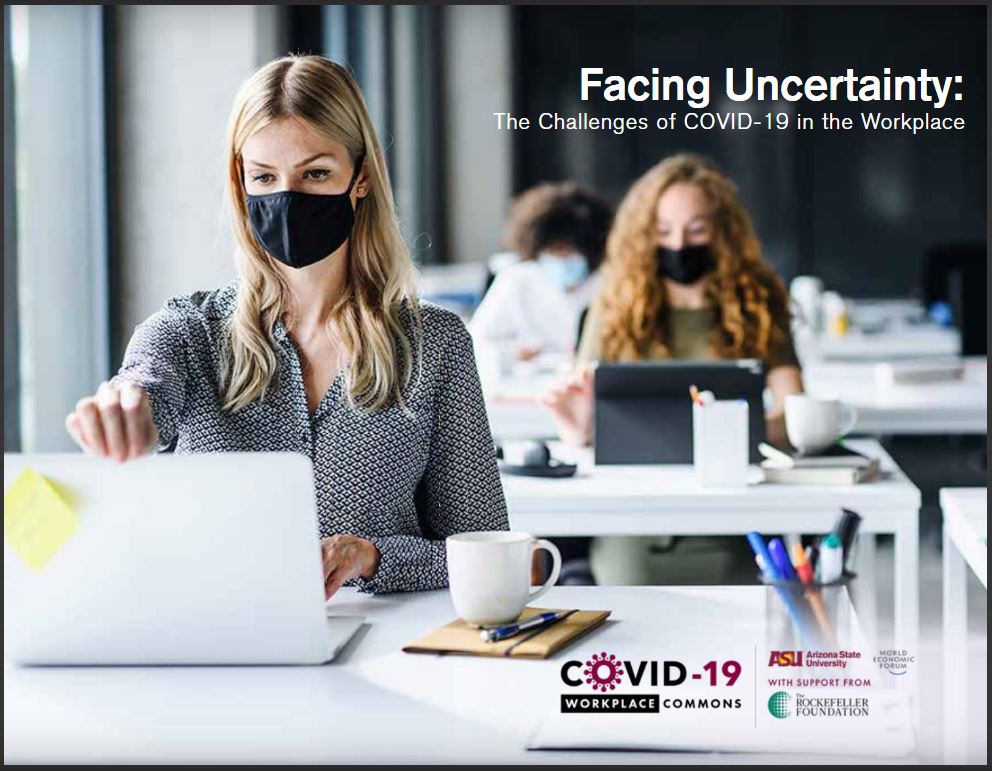A new global business survey conducted by Arizona State University’s College of Health Solutions and the World Economic Forum (WEF), with support from the Rockefeller Foundation, finds that less than 20% of employers report testing their workers for COVID-19, and 35% have permanently reduced their workforce.
The survey, which was completed by 1,125 employers from 29 countries with the majority over a period of six weeks from September to October, found that for companies with employees on-site at the workplace, many are taking some steps to reduce the risk of spreading the virus. Nearly three-fourths (74%) of these companies report they require masks for their employees, and nearly 80% make masks and hand sanitizer available.
When ASU and WEF announced this survey in mid-July, global cases numbered 13.2 million and deaths stood at 575,000. Since then, cases have more than quadrupled to 53.7 million and are rising quickly. Deaths have jumped past the 1.3 million mark. Business leaders face increasingly complex challenges and difficult decisions on how to keep employees and customers safe while remaining open for business.
“How to move the economy forward while keeping people safe is on the mind of every business leader as they continue to navigate the COVID-19 pandemic,” said Mara Aspinall, professor of practice at the College of Health Solutions. “The survey findings give us a clearer picture of the many difficult decisions employers face in trying to reduce the spread of the disease — and why more must be done to expand access to rapid-result testing.”
Results from the first phase of the “COVID-19 Workplace Commons — Keeping Workers Well” survey are now available in a comprehensive report, “Facing Uncertainty: The Challenges of COVID-19 in the Workplace.” The report provides findings from employers across the globe about their approach to testing, contact tracing, facility safety, pandemic response, financial impact and pandemic preparedness.
“We have created a community for leaders to share their challenges and current practices,” said Genya Dana, head of health care transformation at the World Economic Forum. “We believe these resources will help leaders everywhere make informed decisions as the pandemic continues to evolve.”
One of the major challenges of COVID-19? At least 40% of people infected with the virus do not show symptoms and are potential silent spreaders. Without a reason to believe they are infected, asymptomatic patients continue their day-to-day activities around the community and in the workplace and may pass the virus to others who could become critically ill. Still, few employers are testing their employees regularly when they come to work because they find the tests too costly (28%), too complicated to implement (22%), or they are concerned about the accuracy of the tests (18%).
Globally, the majority (65%) of businesses surveyed were small businesses with 25 or fewer employees, with nearly 80% having fewer than 100 employees. With the U.S. accounting for more than one-fifth of the world’s cases and more than one-sixth of total deaths from the virus, the fact that 62.5% of the survey respondents were U.S. businesses paints a critical picture of the landscape of challenges impacting businesses in the country.
“As businesses continue reopening and employees return to the workplace, we are again caught in an intense virus upswing with COVID-19 cases hitting record numbers,” said Dr. Jonathan D. Quick, managing director for pandemic response, preparedness, and prevention, health initiative, with the Rockefeller Foundation. “We must come together and do everything in our power to keep the economy open and keep people safe.”
Additional survey findings include:
- Only 36% of companies had disaster or emergency response plans in place pre-COVID-19, and of those only 39% had plans specifically for epidemics or pandemics; 47% of those said their plan was useful for the pandemic.
- 26% of respondents report increased monthly operating costs of 26% or more (excluding testing expenses).
- Notably, the data revealed that there were few significant differences between U.S. and non-U.S. companies except in contact tracing, where U.S. companies are doing much less compared with other regions (37% for U.S. vs. 54% for non-U.S.).
- 43% of all companies are performing some form of contact tracing, with 58% of them making it mandatory and 17% requiring workers to sign liability waivers.
“By sharing the findings of our survey, we are ensuring broad access to information and truly democratizing knowledge during the pandemic,” said Nate Wade, project co-lead and senior director of strategic initiatives at ASU’s College of Health Solutions.
An interactive data dashboard on the COVID-19 Workplace Commons provides access to the survey data.
In addition to the COVID-19 Workplace Commons, ASU offers the following resources:
- Employer case studies: Spotlights on approaches to workplace safety and business continuity from companies across the world.
- TestingCommons.com: A comprehensive, interactive database of authorized COVID-19 tests worldwide, updated regularly and searchable by test type, technology, regulatory status and many other parameters.
- Taking Back Control During COVID-19 webinar series: Key opinion leaders discuss best practices in innovation, strategy and use of testing and diagnostics in uncertain times.
- Testing Technology Trends (T3 Blog): Evidence-based insights on COVID-19-related technologies for navigating the challenges and improving decision-making.
ASU and WEF will field two more phases of its COVID-19 Workplace Commons — Keeping Workers Well survey in 2021. Employers of all types, sizes and geographic locations are invited to get involved and sign up to participate in the next survey at ASUcovidcommons.com. Findings will be updated and released on the website.

